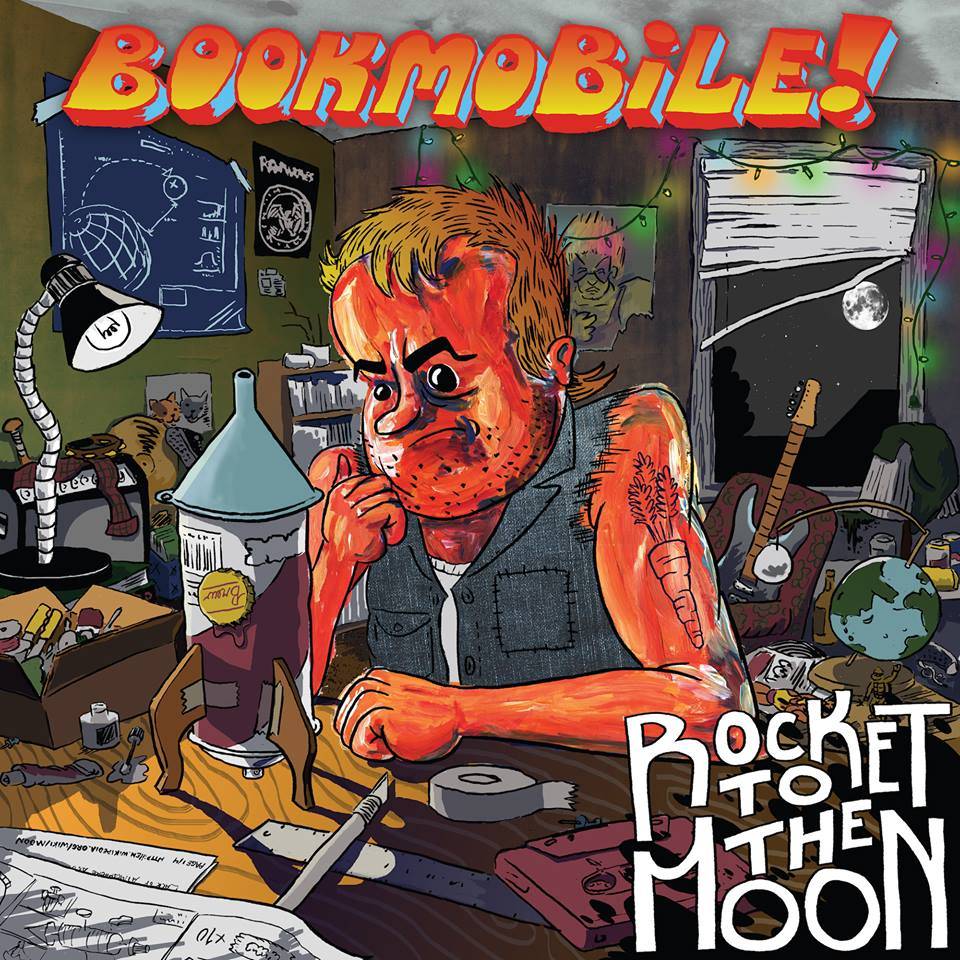OK, so you probably know Bookmobile! by now, right? They’re that three piece that plays catchy, Ramonesey, short, humorous-and-slightly-offensive-but-also-very-relatable, punk tracks? ….They occasionally get the crap beaten out of them on stage by the women of C.L.A.W.? Ringing any bells? Well, they are about to release their first full-length album, Rocket to the Moon, July 8th, 2017, at Fringe Fest, and if the tracks available for preview on the band’s bandcamp page are any indication, it’s going to be really good. Fringe Fest will kick off the band’s Rocket to the Moon tour, running from July 8-August 4, which will take Bookmobile! over to the West Coast.
If you haven’t heard about Fringe Fest yet, it is a festival that is being hosted by Bentley’s Pub, the first weekend of July. It is an insanely good lineup, well worth the mere $15 admission. You absolutely cannot go wrong.
But I digress. I spoke with Bookmobile!’s drummer, Luke Bergkoetter in advance of their album release, about the process behind Rocket to the Moon.

Photo by Tom Chandler/Odd World Photography
Smile Politely: Tell me about the new album.
Luke Bergkoetter: The new record? It’s 21 tracks, and about 27 minutes long. The first and last track are like intro/outro tracks, they’re both like 14 seconds. That leaves 19 core songs. It’s called Rocket to the Moon. The premise of the artwork and the premise of the album is being fed up, and wanting to take a rocket to the moon. There’s a title track of the same name.
SP: Is that a recurring theme throughout?
Bergkoetter: I would say that the recurring theme is…over the top on its frustrations. It’s playing with that punk idea of, “What don’t you like? Write a song about it,” but it’s doing that very self-awarely. Trevor [Dowdy, vocals, guitar] writes a lot of the songs. He’s being very funny in how overtly angry it is, while also just writing pop songs. So it’s over the top song titles like, “I Don’t Like You,” “I Can’t Stand You,” “I’m Thinkin’ About Not Thinkin’ About You.” Very self-aware. If we weren’t doing such a sincere job of making songs that we want people to love, it would be almost like, “post-ironic,” but since we are being so sincere about it, you can’t really call it that. It’s just tapping into really base frustrations. Another track is called, “You Talk a Lot,” and all the lyrics are just, “You talk a lot, you never say a fucking thing. You never say a fucking thing, fuck you,” and that’s it. But we encapsulate it in a very “pop” format. A lot of repetition, a lot of “don’t bore us, let’s just get to the chorus,” starting with the chorus–a lot of songs are just right out the gate with “Here’s the thing that we want you to wake up stuck in your head with, after a show, or after listening to the record.”

Smile Politely: Ok, so, when you have that many songs, that are a little bit more simple in nature, is there a challenge to keep each song different and identifiable? Is that consciously taken into consideration?
Bergkoetter: No, we do. We also get bored with ourselves, while also complaining about other people being boring or annoying or irritating, or our jobs. I ended up taking the reins as producer on this record, and I just wanted to open it up to a lot of options. A lot of different variations of the songs, a lot of extra instrumentation, and I took that from like, the Phil Spector, ‘60’s pop-group model of production, which is like, “invite a bunch of musicians and really create a wall of sound.” That was his “coined” thing: “you really want to create a wall of sound.” So that means calling a friend in to play a saxaphone solo, and my wife Joanna and our friend Christina sang girl-group back up vocals, and we invited Brian Robertson of Lonely Trailer to play organ on five or six tracks, and we had a cello player for one track. [laughs] Her name is Ann Zattervall. She is a professional cellist. She came in to play a song called “True Love,” and it’s only a minute long, and she played on the first thirty seconds of it. And it took hours! To get it all set up, get the sounds right, learn the part–she actually notated the whole thing–and then did a really amazing job; all for a song that is essentially one big punch line. The lyrics are, “I never thought it would happen to me, I never thought it would happen to me, and it didn’t.” It’s like a minute, tops, and we all just thought that was one of the funniest things we could do with that.
So to answer your question, we really wanted a lot of diversity on the record, a lot of different sounds. A lot of stuff we can’t do live. Live, we play as a really stripped down three piece. But when we recorded it, we were like, “We are going to do this all analog, and we are going to take a couple of extra days, just so that we can experiment; just so that we can write more orchestrated parts with our friends, and collaborate, and see what sticks and what doesn’t.”
I borrowed my friend’s vintage tambourine, and went back and doubled every snare hit with a tambourine hit. It’s stuff like that. So now it’s this big, beefy–sort of like if you listened to 60’s or ‘70’s Temptations, like “Papa Was a Rolling Stone,” there is more tambourine there than snare drum. I didn’t go that far, but I definitely wanted every snare hit to have a jangle to it. So I went through and did every tambourine overdub at once, and my hand like swelled up, and turned purple. I mean, on those old ‘60’s jams, the BPM [beats per minute] is like, twice as fast. So you know, just really going to town.
I also played vibraphone on it. Jared [Roberts, bass, vocals] did a lot of guitar overdubs and other guitar parts, because he is an amazing guitar player, along with being a good bass player, you know. So there are like these shredding guitar solos. We definitely wanted it to be its own separate thing from the live show. We messed around with the format. There are a couple of songs that we did like a completely alternate versions of. There is one song that we did more of a “True to form” “doo wop” version of. It was like [hums doo wop part].

SP: So are these going to be available as b-sides, or alternate versions?
Bergkoetter: Oh no, they’re on the record. We had already recorded that song in particular for a cassette single that we released two years ago, so we’ve had that song for along time. Then with another song, “I can’t stand you,”, we did sort of a Western, Swing, Country thing on it. Jared played slide guitar on it, and I played vibraphone on it. There’s even like a “talk down” part on it.” You know? Like in old country songs, there’s a time when everyone gets kind of quiet, and the drummer is just kind of chuggin’ along, and they’re like, [low voice] “Big Jim was workin’ on the blah blah blah one day.” Or like, Patsy Cline would do a lot of like, “Good for nothing boyfriend,” type stuff. So we have this whole thing that’s like a conversation between Trevor and Jared, where Trevor’s like, “You know what Jared? You know what bugs me?” and Jared’s like, “What’s that, Trevor?” And if People aren’t into it, they can definitely blame me, because there was some resistance, but once we got into it, it was so much fun. Aaron McAllister engineered it. All analog instrumentation. My drums are super old, the amps are super old, we used all tube amps, with space echo reverbs with actual tape inside the box. If I had my way–and I almost did it–I wanted to do it mono. I just wanted everything to be right down the middle. For people that know recording, that’s an insane thing to do in 2017. Mono hasn’t been a thing since the ‘70’s. But all those Phil Spector records, even later in his life–and let me point out, Phil Spector was a trash human. He’s a garbage person, who killed his girlfriend and is now rotting away in prison, but he was a genius engineer. He pulled a gun out on the Ramones while they were recording. He was just a cocaine-fueled maniac–but even later into his career, even into the 80’s, he refused to do stereo recording. He wanted all the sound to go right down the middle, nothing left out, nothing panned. So I don’t know if that’s a regret or not, but we did not do mono recording.
SP: Did you record at Earth Analog, in Tolono?
Bergkoetter: Yeah. All to tape, and then we dumped it back into ProTools, and mixed it at Aaron’s shop in Urbana, McCallister Audio.
SP: So you guys have that balance between being very frank, and sincere, but also maintaining humorous elements. Was that an intentional goal, or is just a natural thing for you guys?
Bergkoetter: Yeah. The sincerity part, I don’t know. [I laugh]. Well, Trevor is a really sweet guy, and the band is just a really funny projection of that part of his sense of humor, where it’s like, “All these people are idiots,” but there are also a couple songs that are really tender. “Hamm’s and a Pepsi to Go,” is about a regular that Trevor would have at the [The Brass] Rail. He would come in from his assisted living home, and he would get on the bus, and come to the Rail, drink a Hamm’s, and then order a Pepsi to go. The lyrics are like, “I took the bus from here to there, and no one cares, no one cares.” I’m paraphrasing a little bit, but that song ends with, “Every night, alone, every night, alone.” It’s like…heartbreaking. It’s dive bar culture, which can be a really great thing for people, but then it can also be very depressing. A true dive is not a happy place.

SP: Sure. It can be a lonely thing.
Bergkoetter: Yeah. It can be eleven o’clock on a Tuesday, and you’re drinking beers and socializing, or you can just be waiting for your time to run out. That distinction between the good times and the reality of getting older, being an oldtimer at a bar, where their one excursion a day is to get a Hamm’s at The Brass Rail and go home—that’s poignant shit. We wrapped it up into a good pop song. “They Might Be Giants” were really famous for writing really depressing lyrics, and wrapping them in really happy songs. I don’t know if Trevor is a fan. I think he is. That song is sort of a take on that.
Then there’s this other song, “I Want You to Know,” and that’s just a song about letting a band that Trevor really loves, that broke up, and started bands with other people, called Scared of Chaka, they’re a 90’s punk band, but it’s just kind of a love letter, or a fan letter, and it’s just like, “I hope you’re happy with your friends.” It’s really sweet. He’s a really sweet boy. You can quote me on that.
SP: So, that seems very sincere to me. Sometimes funny, but certainly a “real” message.
Bergkoetter: Right. So like, we’ll follow up “Hamm’s and a Pepsi” with a 16 second song called, “Why Do You Act Like a Dick?” You write songs that you want to hear. Trevor and Jared write the lyrics. Sometimes Jared will write a song that’s a little more serious than the others. He wrote a song about feeling like he’s not a good friend, called “Disappear.” That comes from a very real place of depression, and not knowing what to do with yourself. But you know, that’s why people start bands. What do we do with ourselves? How do we hear the music we want to hear? Oh, we will fuckin’ write it. I am really proud of the record, so I do want to stress that I haven’t heard anything like it. There is other stuff in the genre, but this record in particular, I don’t think there is anything else that sounds like it. The punk purists are going to say, “What is this? What is this polish?” But it’s still a DIY record, we just took our time to be a little more ambitious.

SP: So when will the record be available?
Bergkoetter: It will be available with our album release show, at Fringe Fest, hosted by Bentley’s. The lineup is great. I can’t remember the last time we had a local-only festival.
SP: Agreed. I’m looking forward to it!
Top photo by Veronica Mullen.








